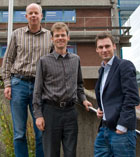
CNCR researchers Arjen van Ooyen (principal investigator), Jeroen Geurts and Markus Butz receive a prestigious grant from the NWO research program Complexity. This program focuses on multidisciplinary research in the area of complex systems driven by real societal problems.
CNCR researchers Arjen van Ooyen (principal investigator), Jeroen Geurts and Markus Butz receive a prestigious grant from the NWO research program Complexity. This program focuses on multidisciplinary research in the area of complex systems driven by real societal problems.
The project is a collaboration between the VU Medical Center (Geurts) and the Computational Neuroscience Group at the CNCR (Van Ooyen and Butz) and was selected with 13 other projects out of 200 applications. They received 445 kEuro to investigate activity-dependent alterations in the connectivity of brain networks during development and brain degeneration (multiple sclerosis).
Brain cells rewire their synaptic connections not only during development but also in adulthood and particularly after brain damage and degeneration. Synaptic connections determine the flow of electrical activity in brain networks, and long-term changes in activity in turn induce compensatory changes in connectivity. Using novel computational models, the researchers will investigate how this complex reciprocal interaction between activity and connectivity is involved in the development of brain networks and in the brain degeneration observed in multiple sclerosis.
Traditionally, multiple sclerosis is seen as a white matter disease. Recently, Geurts and colleagues found that gray matter is also affected and shows a sudden acceleration in decline. The cause for this rapid loss in gray matter is unclear, and experimental work has so far provided insufficient understanding. The researchers will investigate whether the interplay between electrical activity and network connectivity holds the key to this degenerative process. Their work may lead to important new insights in the pathogenic mechanisms of multiple sclerosis and to new therapeutic approaches for slowing down brain degeneration.
For more information see http://www.nwo.nl/nwohome.nsf/pages/NWOA_7BUJ6J